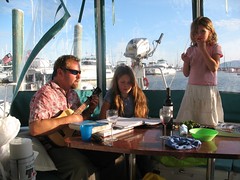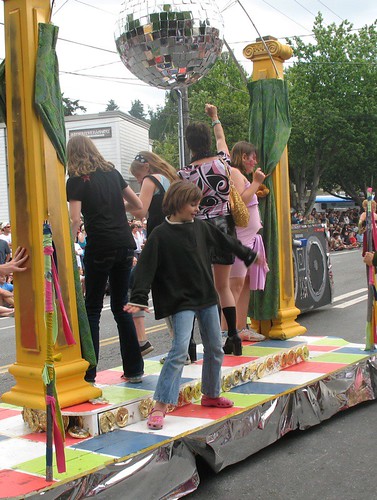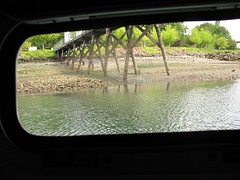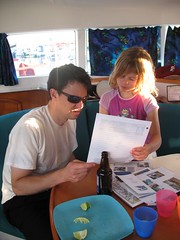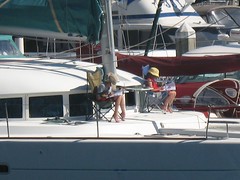I do not know how it works in the rest of the world, but here in the Pacific Northwest you will find that ports and marinas offer a very limited set of services for your nightly slip fee. For your one-dollar-per-water-line-foot, you get the privilege of tying your gorgeous hunk of plastic goodness up to their nasty, tar-covered, rotting wooden dock. If you have a very, very long electrical cord, you can drape it like a popcorn string across the dock to a plug somewhere south of Olympia and leech power off the land grid. If the sea godz are with you, you might also find a water hose somewhere within a hundred yards of your location. Everything else costs money.
Basically, I am not particularly impressed with the variety and quality of services available to us in most of the marinas we would like to casually tie up to for the night. In fact, I'm so unimpressed that most of the time when we're out and about, Don Quixote doesn't bother. Oh sure, we like the amenities of the small coastal towns and island villages as much as the next cruiser. But rather than spend $38 just to stop moving for a few hours, we prefer to drop our anchor about 50 feet off the marina entrance.
Yes, we're that big, French two-hulled wonder blocking your way in. We are the poor white trash with the laundry dangling next to our feet on the rails as we sip box red and comment about the quality of your boat and rigging as you slowly motor your way into the exclusive yacht club docks. We are the loud family attempting to wash five filthy bodies in two-minute bursts in the women's shower, screaming at the cold water, and laughing hysterically at bizarrely creative soapsud hairdos. We fill your washer and dryer with towels, throw rugs, and blue cloths, hog the newspaper while we sip lattes in the marina cafe, and generally devastate the free book table wherever it might be found.
Yes, we are the freeloaders.
Initially, we were very quiet – even sneaky – about this. We would park the boat someplace just out of sight... perhaps behind some 40-foot legacy of the sailing dark ages slowly rotting into oblivion on a mooring ball within site of the marina. Rowing our dinghy softly to the guest dock in the dusky hour when sensible sailors are firing up the grill and pouring out the martinis, we would sneak into the laundry room, the shore head, and the local grocery.
But then we discovered probably the most important bit of information about marinas: Nothing is free. Nothing. Your slip fee is really just that – a slip fee. To do laundry, you pay. To shower, you pay. Even to pee, you pay. And the universal coin of the realm is the quarter. Two quarters to shower, four to wash, six to dry. The marina is a beast which consumes quarters faster than an SUV sucks gas.
And the quarters are unidirectional. This isn't like Vegas or Reno. At least in those venerable cities, you pour silver dollars into the machine and in return you get bells, bings, beers, and the occasional lapful of silver dollars. If you break a $20 at the 7-Eleven, you receive a handful of shiny silver coins in return.
Quarters in a marina, however, disappear. They go into the machines and are inexplicably never seen again. You can ask the harbor master, but he'll tell you to use the coin machines. You can try the coin machines, but they are – to a machine – busted. The grocer can't help you, and the bar won't. The bank is in town and is either closed or requires that you walk up a steep cliff roughly the height of a small skyscraper. And when you get there, odds are you will find that they won't sell you quarters unless you have an account. Or they don't have any quarters left because every other mariner within a mile has already cleaned them out.
I don't know where the quarters go. It's one of life's mysteries, I suppose. It ranks up there with hanging chads, the Bermuda triangle, and the popularity of Rush Limbaugh. All I can do is recommend that before you ship out, you invest in a metric ton of this precious metal.
The long and the short of it is that fee for service marinas stripped us all modesty and discretion. Now we don't bother sneaking around. We drop anchor just outside whatever seems a reasonable boundary of “marina water” and load down the dinghy with dirty laundry, smelly children, and a suitcase of quarters. Then we roar into town, guns blazing, coins flashing, voices raised, “Your clean water, or your lives!”
Wednesday, June 27, 2007
Tuesday, June 19, 2007
Outnumbered by the Enemy
There is something dead on this boat, and it isn't in the head. I step aboard after a pleasant walk on shore and my motherly hackles go up.
“Dean, do you smell it?”
Stupid question, actually. He doesn't smell things. I don't know if this is an individual characteristic or an inherent property of the male species. His sniffer just tunes out anything but the smells of hops, Taco Bell, and a particular brand of shampoo I used back when we first got together. When I reflect on it, all five of his senses have a high capacity filter that would put a water maker to shame. He hears only what he wants to hear, sees what interests him, and tastes cinnamon and vanilla when I try to sneak them into pancake batter. So “No,” was a foregone conclusion.
“Aeron?” I ask.
I hear a quick, “Maybe,” as my six-year-old daughter ducks under Dr C's arm and disappears into the port hull. Aeron outgrew the tremendous fun of Opposite Day and has moved on to Maybe Day. Maybe means yes-but-I-know-saying-yes-might-get-me-into-trouble. I lean down into the port side and say in my most firm mommy voice, “What do I smell?”
Eight–year-old ingénue Mera smiles sweetly, “Sea urchin.”
Sea urchin. Dead sea urchin, presumably. If it's on the boat, it's dead. “And does the sea urchin have a name?” I ask.
“Charlie.”
Right. “And does the sea urchin have a home?” You can tell I've done this before.
In fact, I do this daily now that we live on a boat. My eldest Jaime has a passionate desire to be a vet, volunteers for a pet store, and spends all her free time prowling the tide line. Aeron is a magpie crossed with a pack rat and stuffed into a small box full of pink shiny satin and bright bobs of bacteria-encrusted coastal pebbles and shells.
But it is Mera who must be most closely and carefully observed, because she has an imagination. Aeron and Jaime just collect the stuff, play with it for a few hours, and then throw it back overboard. Mera, however, sees a world of adventure in every found object. All those lovely crab shells and pieces of driftwood, robins, eggs, dead starfish, and barnacle-encrusted rocks. Each tells a story.
So yes, Charlie the Sea Urchin has a home. He lives with Beach Babe Barbie (I swear this is Mera’s name and not mine). “He is her body guard,” Mera tells me. “He sits between Barbie and the hatch and keeps the gulls from getting in.”
Now this is actually plausible. The smell of Charlie might well keep any self-respecting sea gull from attacking the cabin. I'm thinking the fact that Beach Babe happens to be buck naked and hidden behind a history book and a box of art supplies might be a greater deterrent. My impulse is to grab Charlie and chuck it out the window, but like any good homeschool parent, I try to find a positivist, educational way to get the dead thing off the boat.
“Mera, I just don't think Charlie is cutting the mustard as a body guard.” Mera regards me seriously, nodding her head slowly. “It's my impression speaking with Mocha Bunny and Sparkelina that the gulls are getting a little cocky and Charlie is just not big enough to fight them off... long spines not withstanding.”
“You might be right, Mommy.” Of course, I'm right because if you don't get this dead thing off my boat in the next fifteen seconds I'm going to start screaming. “I'll speak to Barbie about this. She might need to fire him.” Yes, fire him. Off the bow, the beam or the port transom at high velocity.
The thing is, my heart just isn't into it; I know I'm fighting a losing battle. The dead things outnumber me, and I've only got so many career-ruining lies in my repertoire to get them fired.
“Dean, do you smell it?”
Stupid question, actually. He doesn't smell things. I don't know if this is an individual characteristic or an inherent property of the male species. His sniffer just tunes out anything but the smells of hops, Taco Bell, and a particular brand of shampoo I used back when we first got together. When I reflect on it, all five of his senses have a high capacity filter that would put a water maker to shame. He hears only what he wants to hear, sees what interests him, and tastes cinnamon and vanilla when I try to sneak them into pancake batter. So “No,” was a foregone conclusion.
“Aeron?” I ask.
I hear a quick, “Maybe,” as my six-year-old daughter ducks under Dr C's arm and disappears into the port hull. Aeron outgrew the tremendous fun of Opposite Day and has moved on to Maybe Day. Maybe means yes-but-I-know-saying-yes-might-get-me-into-trouble. I lean down into the port side and say in my most firm mommy voice, “What do I smell?”
Eight–year-old ingénue Mera smiles sweetly, “Sea urchin.”
Sea urchin. Dead sea urchin, presumably. If it's on the boat, it's dead. “And does the sea urchin have a name?” I ask.
“Charlie.”
Right. “And does the sea urchin have a home?” You can tell I've done this before.
In fact, I do this daily now that we live on a boat. My eldest Jaime has a passionate desire to be a vet, volunteers for a pet store, and spends all her free time prowling the tide line. Aeron is a magpie crossed with a pack rat and stuffed into a small box full of pink shiny satin and bright bobs of bacteria-encrusted coastal pebbles and shells.
But it is Mera who must be most closely and carefully observed, because she has an imagination. Aeron and Jaime just collect the stuff, play with it for a few hours, and then throw it back overboard. Mera, however, sees a world of adventure in every found object. All those lovely crab shells and pieces of driftwood, robins, eggs, dead starfish, and barnacle-encrusted rocks. Each tells a story.
So yes, Charlie the Sea Urchin has a home. He lives with Beach Babe Barbie (I swear this is Mera’s name and not mine). “He is her body guard,” Mera tells me. “He sits between Barbie and the hatch and keeps the gulls from getting in.”
Now this is actually plausible. The smell of Charlie might well keep any self-respecting sea gull from attacking the cabin. I'm thinking the fact that Beach Babe happens to be buck naked and hidden behind a history book and a box of art supplies might be a greater deterrent. My impulse is to grab Charlie and chuck it out the window, but like any good homeschool parent, I try to find a positivist, educational way to get the dead thing off the boat.
“Mera, I just don't think Charlie is cutting the mustard as a body guard.” Mera regards me seriously, nodding her head slowly. “It's my impression speaking with Mocha Bunny and Sparkelina that the gulls are getting a little cocky and Charlie is just not big enough to fight them off... long spines not withstanding.”
“You might be right, Mommy.” Of course, I'm right because if you don't get this dead thing off my boat in the next fifteen seconds I'm going to start screaming. “I'll speak to Barbie about this. She might need to fire him.” Yes, fire him. Off the bow, the beam or the port transom at high velocity.
The thing is, my heart just isn't into it; I know I'm fighting a losing battle. The dead things outnumber me, and I've only got so many career-ruining lies in my repertoire to get them fired.
Friday, June 08, 2007
Role Reversal
There are two types of folks on a sail boat: those who twiddle the sails, and those who avoid it.
What is a sail twiddler, you ask? Well let me tell you. A sail twiddler is a person who can't leave the lines alone during a long tack. He trims the jib, twitches the main sheet, fiddles with the traveler. She constantly fidgets at the helm, adjusts the bearing and the course. His eye is always on the telltales and the knot meter, her attention never wavers from the GPS indicator for speed over ground. All of these actions are taken in the hope of coaxing additional teeny weeny fractions of a knot out of the sails.
A sail twiddler is the least relaxing human being you can possibly cruise with. The scenario looks like this: you are trapped in a boat with four people for five hours. The wind is 12 knots from the south 55 degrees off your starboard bow. Ideally, as helmsman you set the sails for a starboard close haul and put Auto in charge. Then you grab a good book, a glass of lemonade and a bag of pretzels, and settle in on the tramp, glancing up every few minutes to check for freighters, power boats, and stray seals.
But if there is a sail twiddler on board, you'll find that your starboard close haul is not the most efficient way to get from Point A to Point B. No, your boat is a catamaran and would go a lot faster if you were to fall off the wind a bit. Then you're going to let out this deelybob, slide over that thingamajig, tug on the other whatchamaclallit, and poof! now you are going at least a half knot faster.
The problem with this theory is that at some point in the not so distant future, you are going to have to tack. Tacking involves getting up off your cozy cushion on the tramp and shlepping to the back of the boat to mess with rope. There will be yelling even if everything goes well because that's what you do. You yell cryptic things like, "Helms alee!" and "Fire in the hole!" Then you yank on stuff. Inevitably when you get back to your cushions, the wind will have lost your page or knocked over your drink. But now you can sit, right?
Wrong. Because now you're whipping along in this broad zag toward a big rock in the middle of friggin’ nowhere and at some point you are going to have to zig to avoid it, then zag to get more wind and speed along, then zig to get back to your course, then zag into a tidal current, then zig to avoid running into an island.
And so on.
And the horrible thing to admit is that I always thought Dr C was a sail twiddler. I really expected him to be a sail twiddler. He sure as hell is an everything else twiddler. The man doesn't have the slightest clue how to sit still. On our first vacation down at his parents' cabin in Baja, I drank tequila on the deck and read romance novels for three days while Dr C moved the water tank and rebuilt the outhouse. His idea of relaxing at anchor is to install a new inverter.
So pardon me if my natural expectation was that I would expend a great deal of ingenuity conjuring clever methods to avoid helping trim the sails. He would twiddle, I would drink lemonade, and basically we'd do same ole' same ole' at the Conger household... except on a boat.
However, this pleasantly familiar scene does not play out on Don Quixote. Au contraire! Dr C has better things to do while we are underway. Take today, for example. During our three-hour trip from Seattle to Port Madison, Dr C reinstalled the galley foot pump, changed the lamp mantle, fixed the squeaky starboard doors, and installed a speaker for the VHF in the cockpit.
You know what I did? I twiddled the sails. And let me tell you, the pleasure I get from twiddling the sails makes it feels as pornographic as it sounds.
My name is Toast. And I'm a sail twiddler.
What is a sail twiddler, you ask? Well let me tell you. A sail twiddler is a person who can't leave the lines alone during a long tack. He trims the jib, twitches the main sheet, fiddles with the traveler. She constantly fidgets at the helm, adjusts the bearing and the course. His eye is always on the telltales and the knot meter, her attention never wavers from the GPS indicator for speed over ground. All of these actions are taken in the hope of coaxing additional teeny weeny fractions of a knot out of the sails.
A sail twiddler is the least relaxing human being you can possibly cruise with. The scenario looks like this: you are trapped in a boat with four people for five hours. The wind is 12 knots from the south 55 degrees off your starboard bow. Ideally, as helmsman you set the sails for a starboard close haul and put Auto in charge. Then you grab a good book, a glass of lemonade and a bag of pretzels, and settle in on the tramp, glancing up every few minutes to check for freighters, power boats, and stray seals.
But if there is a sail twiddler on board, you'll find that your starboard close haul is not the most efficient way to get from Point A to Point B. No, your boat is a catamaran and would go a lot faster if you were to fall off the wind a bit. Then you're going to let out this deelybob, slide over that thingamajig, tug on the other whatchamaclallit, and poof! now you are going at least a half knot faster.
The problem with this theory is that at some point in the not so distant future, you are going to have to tack. Tacking involves getting up off your cozy cushion on the tramp and shlepping to the back of the boat to mess with rope. There will be yelling even if everything goes well because that's what you do. You yell cryptic things like, "Helms alee!" and "Fire in the hole!" Then you yank on stuff. Inevitably when you get back to your cushions, the wind will have lost your page or knocked over your drink. But now you can sit, right?
Wrong. Because now you're whipping along in this broad zag toward a big rock in the middle of friggin’ nowhere and at some point you are going to have to zig to avoid it, then zag to get more wind and speed along, then zig to get back to your course, then zag into a tidal current, then zig to avoid running into an island.
And so on.
And the horrible thing to admit is that I always thought Dr C was a sail twiddler. I really expected him to be a sail twiddler. He sure as hell is an everything else twiddler. The man doesn't have the slightest clue how to sit still. On our first vacation down at his parents' cabin in Baja, I drank tequila on the deck and read romance novels for three days while Dr C moved the water tank and rebuilt the outhouse. His idea of relaxing at anchor is to install a new inverter.
So pardon me if my natural expectation was that I would expend a great deal of ingenuity conjuring clever methods to avoid helping trim the sails. He would twiddle, I would drink lemonade, and basically we'd do same ole' same ole' at the Conger household... except on a boat.
However, this pleasantly familiar scene does not play out on Don Quixote. Au contraire! Dr C has better things to do while we are underway. Take today, for example. During our three-hour trip from Seattle to Port Madison, Dr C reinstalled the galley foot pump, changed the lamp mantle, fixed the squeaky starboard doors, and installed a speaker for the VHF in the cockpit.
You know what I did? I twiddled the sails. And let me tell you, the pleasure I get from twiddling the sails makes it feels as pornographic as it sounds.
My name is Toast. And I'm a sail twiddler.
Thursday, June 07, 2007
A Day in the Life of a Homeschooler
Inquiring minds want to know, “What’s it like homeschooling the girls? What’s your average day like?”
“Well, it’s a lot like your day, really. Not much different,” I reply. I’m not really lying so much as completely shutting the conversation down so I can get back to whatever it is I really want to do at that particular moment. Or maybe I just want to sound like it’s me, the mama/teacher, that’s in control.
A homeschool day bears very little resemblance to any day ever experienced by your standard suburban American family with two incomes and three kids in school. The differences start with the sun rising – though in Seattle even that it is an optional feature – and end when the sun goes down. Everything in between is pretty much a crap shoot. Any little bit of a homeschool day that resembles regular work and regular school and regular family life is purely coincidental.
For example, the girls do not see their father in the mornings any more, and I do not willingly spend time with them after dinner. We used to divide the morning harangue and the evening story-time cuddling about evenly between us. We used to divide cooking, cleaning, and wiping asses pretty much 50-50 as well. Now Dean gets up at a sub-human hour, sweats with a bunch of middle-aged men on a basketball court, and then heads straight to work leaving with me with the morning cacophony.
If you are a parent, then this phrase should resonate: Mornings blow chunks. You thought they sucked when you were single and so hung over you could feel your heart beat in your eye balls, but you were as yet untutored to the truths of family life. Nothing compares to the daily hell faced by parents attempting to get their children to school.
First, children don’t wake well. Waking your average six-year-old is like trying to wake a mature bear in February. My understanding is that this only gets worse until they hit about 30. If you can muster them out of bed, you then confront the challenge of getting them dressed. You might think a ten-year-old fully capable of getting dressed properly until yours skips down the stairs on a blustery winter day dressed only in shorts and a tank top. Sulky is the most polite word to describe the expression you’ll receive when explaining that 38 degrees Fahrenheit with winds 20 to 25 knots makes it a pants and long sleeves day.
Breakfast is easy if you want to feed them cereal. If you want to do that noble, responsible thing, you need to stretch your culinary talents into realms of chicken embryos, fried pig, and one of the five thousand ways to serve bread, sugar, and cinnamon.
Of course, chores are next. The beds, the wet bath towels, the dead hamster. All of these need attention and effort. The dishes should be stowed and all the prior evening’s entertainment should be put away before anyone considers starting to educate the Nation’s Future. After all, you might be visited by Child Protective Services sometime during the day. Or worse, the house/boat could catch fire and those sexy firemen could show up. Manky, poop-smeared panties on the bathroom floor, abandoned in a frenzy of cleanliness and bathing the night before, are just not acceptable.
Moving onward, you must now lay out the school supplies. Pencils are like socks in the dryer, only worse. It seems like every morning we have to turn the boat upside down to find a Pencil Quorum enabling every student in our mini-school to do her work. Where is the half-finished book report? The ingredients for the practical life lesson – “This week manicotti the way your dad’s grandma made it!” Why the hell does the science textbook look like it went through the washing machine? Afternoon errands mean we need all the library books in the library bag and the grocery list and all of Mom’s microdot checks from miscellaneous clients.
Let’s all go through the final check list. Vitamins? Check. School stuff? Check. Breakfast consumed? Check. Beds made? Check. Okay, deep breath. Now we are ready for school.
Wait a minute. I take it all back. This all sounds identical to normal school life.
“Well, it’s a lot like your day, really. Not much different,” I reply. I’m not really lying so much as completely shutting the conversation down so I can get back to whatever it is I really want to do at that particular moment. Or maybe I just want to sound like it’s me, the mama/teacher, that’s in control.
A homeschool day bears very little resemblance to any day ever experienced by your standard suburban American family with two incomes and three kids in school. The differences start with the sun rising – though in Seattle even that it is an optional feature – and end when the sun goes down. Everything in between is pretty much a crap shoot. Any little bit of a homeschool day that resembles regular work and regular school and regular family life is purely coincidental.
For example, the girls do not see their father in the mornings any more, and I do not willingly spend time with them after dinner. We used to divide the morning harangue and the evening story-time cuddling about evenly between us. We used to divide cooking, cleaning, and wiping asses pretty much 50-50 as well. Now Dean gets up at a sub-human hour, sweats with a bunch of middle-aged men on a basketball court, and then heads straight to work leaving with me with the morning cacophony.
If you are a parent, then this phrase should resonate: Mornings blow chunks. You thought they sucked when you were single and so hung over you could feel your heart beat in your eye balls, but you were as yet untutored to the truths of family life. Nothing compares to the daily hell faced by parents attempting to get their children to school.
First, children don’t wake well. Waking your average six-year-old is like trying to wake a mature bear in February. My understanding is that this only gets worse until they hit about 30. If you can muster them out of bed, you then confront the challenge of getting them dressed. You might think a ten-year-old fully capable of getting dressed properly until yours skips down the stairs on a blustery winter day dressed only in shorts and a tank top. Sulky is the most polite word to describe the expression you’ll receive when explaining that 38 degrees Fahrenheit with winds 20 to 25 knots makes it a pants and long sleeves day.
Breakfast is easy if you want to feed them cereal. If you want to do that noble, responsible thing, you need to stretch your culinary talents into realms of chicken embryos, fried pig, and one of the five thousand ways to serve bread, sugar, and cinnamon.
Of course, chores are next. The beds, the wet bath towels, the dead hamster. All of these need attention and effort. The dishes should be stowed and all the prior evening’s entertainment should be put away before anyone considers starting to educate the Nation’s Future. After all, you might be visited by Child Protective Services sometime during the day. Or worse, the house/boat could catch fire and those sexy firemen could show up. Manky, poop-smeared panties on the bathroom floor, abandoned in a frenzy of cleanliness and bathing the night before, are just not acceptable.
Moving onward, you must now lay out the school supplies. Pencils are like socks in the dryer, only worse. It seems like every morning we have to turn the boat upside down to find a Pencil Quorum enabling every student in our mini-school to do her work. Where is the half-finished book report? The ingredients for the practical life lesson – “This week manicotti the way your dad’s grandma made it!” Why the hell does the science textbook look like it went through the washing machine? Afternoon errands mean we need all the library books in the library bag and the grocery list and all of Mom’s microdot checks from miscellaneous clients.
Let’s all go through the final check list. Vitamins? Check. School stuff? Check. Breakfast consumed? Check. Beds made? Check. Okay, deep breath. Now we are ready for school.
Wait a minute. I take it all back. This all sounds identical to normal school life.
Subscribe to:
Posts (Atom)

